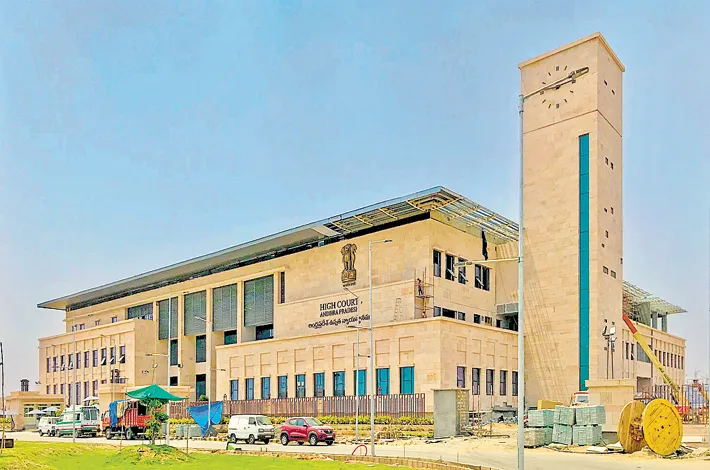AP High Court Reinforces Free Speech Protection
07-07-2025 12:00:00 AM

-High Court issued a circular on July 5, pointing out that multiple FIRs are being registered across various police stations over the same social media post or comment
- The court specifically cautioned against mechanical remand orders
- The Supreme Court had quashed an FIR against Congress MP Imran Pratapgarhi for sharing a poem online, ruling that the criminal law must not be used to stifle artistic or political expression
Kiranmai Tutika I amaravati
In a landmark move to safeguard the constitutional right to free expression, the Andhra Pradesh High Court has issued a stern directive to all Judicial Magistrates across the state, mandating strict adherence to Supreme Court guidelines before ordering remands in social media-related cases involving offences punishable by less than seven years. The circular, issued by the Registrar (Judicial) on July 5 addresses a growing trend of arbitrary arrests and remands, particularly targeting political figures and opposition supporters, over allegedly objectionable social media posts.
The High Court’s intervention comes in response to a surge in First Information Reports (FIRs) registered across various police stations for identical social media content, often critical of the ruling TDP-BJP-Jana Sena alliance. The court has taken a firm stand against what it describes as “mechanical remand orders” that fail to comply with established legal safeguards, particularly in cases involving posts deemed “indecent” or “objectionable.” The directive emphasizes the need to protect free speech and prevent the misuse of criminal law to suppress dissent or political criticism.
The circular specifically references two pivotal Supreme Court judgments: Arnesh Kumar v. State of Bihar (2014) and Imran Pratap Gadhi v. State of Gujarat (2025). The Arnesh Kumar guidelines were established to curb arbitrary arrests in cases where the maximum punishment is less than seven years. These guidelines require police to justify the necessity of an arrest and mandate that Judicial Magistrates independently assess whether such arrests are warranted before approving remands.
The Imran Pratap Garhi judgment, delivered earlier this year, further reinforced protections for free expression by quashing an FIR against Congress MP Imran Pratapgarhi for sharing a poem online. The Supreme Court ruled that criminal law must not be weaponized to stifle artistic or political expression, setting a precedent for handling social media-related cases.
The Andhra Pradesh High Court’s circular highlights a troubling pattern of non-compliance with these guidelines. “It has been brought to the notice of the High Court that most of the Judicial Magistrates are remanding the accused in cases pertaining to social media postings/comments without adhering to the principles laid down,” the circular states. It notes that many arrests involve members of the opposition YSR Congress Party, who have been detained for posting content critical of the ruling alliance. This has raised concerns about the potential misuse of legal processes to target political opponents.
The court has directed Magistrates to rigorously scrutinize remand requests in such cases. Before approving judicial custody, Magistrates must ensure that the investigating officer has complied with the Arnesh Kumar guidelines. This includes verifying whether the accused has a history of repeated offences, poses a risk of tampering with evidence or influencing witnesses, or requires custodial interrogation for the investigation’s progress. “It is not fair to send the accused to judicial remand in such cases mechanically,” the circular emphasizes, urging Magistrates to exercise due diligence.
The High Court’s directive also carries a strong warning: failure to comply with these instructions will have serious consequences. Judicial officers who violate the circular risk being held liable for contempt of court and facing departmental disciplinary action. This underscores the court’s determination to enforce compliance and protect citizens’ rights against arbitrary state action.
The issue of arbitrary remands in social media cases has sparked widespread debate in Andhra Pradesh, particularly amid the state’s polarized political climate. Data from the Andhra Pradesh Police indicates that over 150 FIRs have been registered in 2025 alone for social media-related offences, with nearly 70% of these cases involving alleged criticism of ruling alliance leaders. Legal experts estimate that a significant portion of these cases fall under sections of the Indian Penal Code (IPC) or the Information Technology Act, which carry punishments of less than seven years, making them subject to the Arnesh Kumar guidelines.
Civil rights advocates have hailed the High Court’s directive as a crucial step toward protecting free speech. “The circular sends a clear message that the judiciary will not tolerate the misuse of criminal law to silence dissent,” said Advocate Priya Rao, a prominent legal commentator based in Vijayawada. “Social media has become a battleground for political expression, and this directive ensures that citizens can exercise their rights without fear of arbitrary arrest.”
However, some political analysts argue that the implementation of the directive will face challenges. “While the High Court’s intentions are clear, ensuring consistent adherence across all districts will require robust oversight,” noted political analyst Dr. K. Srinivas. He pointed to the need for training programs for Judicial Magistrates and police officials to align their practices with the Supreme Court’s guidelines.
The Andhra Pradesh High Court’s circular marks a significant judicial intervention to uphold constitutional protections in the digital age. By reinforcing the Arnesh Kumar and Imran Pratap Garhi judgments, the court has reaffirmed its commitment to safeguarding free expression and curbing the misuse of criminal law. As social media continues to shape public discourse, this directive serves as a critical reminder that the right to dissent is a cornerstone of democracy, one that must be fiercely protected against arbitrary state action.








